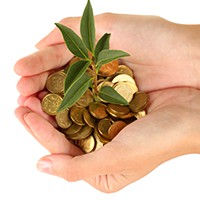Last updated: December 12 2016

Canada’s Blessings: Wealth Has Grown Over Time
There are so many reasons to count our blessings as Canadians; in the financial arena, one of them is the growth in Canadian wealth over time. While we are behind the US by 22% in terms of wealth per adult ($270,200 vs. $344,700), in Canada wealth has grown at an average rate of just under 6% in the period 2000-2016, and an average of 6.5% since 2010. Why are we so lucky?
According to Credit Suisse Research Institute’s Global Wealth Report, released in November 2016, this is largely due to Canada’s housing prices and our low interest rate environment. But it also has a lot to do with our well educated population and stable workforce.
The report finds that home ownership is a key element in building household wealth and it cites the following risk factors associated with low wealth:
1. Being young,
2. Being single,
3. Being female,
4. Being poorly educated
5. Having three or more children
6. Being a young, single mom with low education and no job
The issue of being young and unemployed is of particular concern, especially since the global financial crisis; so is the incidence of the size and frequency of student loans. There is work to be done here by financial advisors, in assisting young people to reverse the trend from accumulating debt to building wealth as they move into middle age.
It’s interesting that in the US, more than half of household wealth is held in financial assets. However, in Canada wealth is more equally distributed than in the south: median wealth in Canada is $96,700 per adult, compared to $45,000 in the US. More important, we have fewer people with wealth of less than $10,000 US, and more people with wealth over $100,000.
 |
Despite its small population (0.6% of the world’s adult population), and recent significant blows to our economy with the drop of world oil prices since 2015, Canada is home to 4% of the world’s top 1% of wealth holders. There are currently 1.1 million millionaires in Canada.
Overall, global wealth is predicted to increase by 31% over the next five years, an annual growth rate of 5.5%; and financial wealth will outpace non-financial wealth (such as real estate, including the principal residence) by 0.5% annually. The report goes on to predict that by 2021, the number of ultra-high-net-worth individuals will increase to over 200,000 globally, with more than half of these residing in North America. Canada is expected to overtake Italy for 7th place in these rankings.
There are now 33 million high net worth (HNW) individuals in the world, and 140,900 adults who are considered ultra-high net worth, with net wealth over $50 million USD. Canada is home to just under 3,000 of these individuals.
Sadly, however, there are 2.4 billion adults in the bottom half of the measure of global wealth distribution. The Credit Suisse report has devoted an entire chapter to “the bottom billion,” outlining the plight of people with low income and high needs, and their inability to acquire and retain assets. Worse, often there is negative net worth among this population: their debt exceeds the value of assets.
The moral? Building wealth, both financial and non-financial, is meaningful in lifting people out of poverty. That begins with a sound education, gainful employment or self-employment, a healthy family life, a commitment to saving at least some money on a consistent basis with which to leverage and shore up human capital, and the responsible use of credit.
At this time of the year, it feels good to count our blessings and recognize the honor and privilege of sharing Knowledge Bureau’s resources and insights in helping others build wealth and peace of mind for the future.
In gratitude for your continued support, please accept my very best wishes for the holiday season. May it be restful, joyful and peaceful. Best wishes for 2017—may yours be blessed with good health and prosperity.
Evelyn Jacks is President of Knowledge Bureau, Canada’s leading educator in the tax and financial services, and author of 52 books on family tax preparation and planning.
©2016 Knowledge Bureau Inc. All Rights Reserved.





